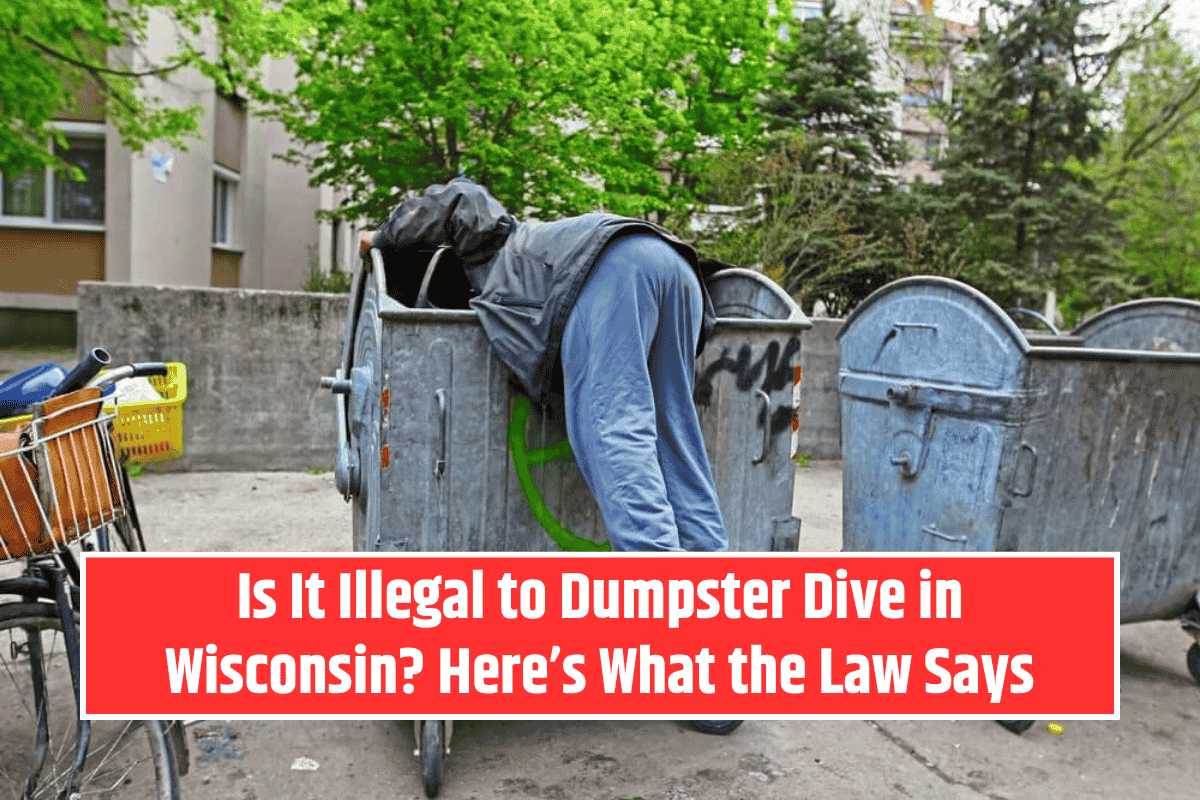Dumpster diving, the act of searching through trash to find usable items, has become a popular activity for many looking to reduce waste, save money, and promote sustainability.
In Wisconsin, dumpster diving is generally legal, but there are important rules and safety guidelines you should know before you dive in. Understanding local ordinances, trespassing laws, and health concerns is crucial to ensuring that your efforts are both legal and safe.
Key Takeaways
- Dumpster diving is legal under Wisconsin state law, with some exceptions.
- Local ordinances may restrict dumpster diving in certain cities.
- Trespassing laws apply—always get permission before entering private property.
- Prioritize safety, hygiene, and cleanliness when diving.
- Dumpster diving can help support environmental sustainability by reducing waste.
Is Dumpster Diving Legal in Wisconsin?
Yes, dumpster diving is legal in Wisconsin. The state has no laws that specifically prohibit the practice. However, it’s important to note that while the state does not ban dumpster diving, local regulations can vary by city or county.
This means that even though dumpster diving is generally allowed, some municipalities may have rules or restrictions in place that limit or regulate it.
Additionally, where you dive matters. Dumpster diving is generally allowed on public property, but problems can arise if you are scavenging on private property or in areas where access is restricted. For example, if the dumpster is behind a business, fenced off, or has a “No Trespassing” sign nearby, diving could lead to legal issues.
Local Ordinances and Property Rules
Different cities or counties in Wisconsin may have specific rules that restrict dumpster diving. Some areas might require the property owner’s permission before taking anything from a dumpster. Additionally, some cities have anti-scavenging ordinances that prevent dumpster diving in residential or commercial areas to protect businesses and private property owners.
Before you start diving, it’s a good idea to check with your local city or county office for updated laws or ordinances that could apply to your area. Many local governments provide this information on their websites.
Wisconsin Trespassing Laws and Dumpster Diving
While taking items from a dumpster is not illegal, trespassing laws are where most legal issues arise. In Wisconsin, trespassing is illegal, and entering private property without permission can result in fines or other penalties.
Here’s where you need to be careful:
- Private property: Dumpster diving on private property, especially behind a locked fence or gate or in areas marked with “No Trespassing” signs, is considered trespassing.
- Public property: Dumpster diving is generally legal on public property such as public sidewalks, alleyways, and curbside trash bins (placed for collection).
If you are unsure whether an area is public or private, it’s always better to avoid the risk and look for more accessible and legal options.
Where You Can Safely Dive
- Public sidewalks: Areas that are open to the public, where trash is placed for collection, are generally safe for diving.
- Alleyways: If they are publicly accessible, alleyways are often a good spot for finding discarded items.
- Curbside trash: Trash that has been placed on the curb for collection is generally considered public property and can be safely explored.
Where You Should Avoid
- Private property: Do not dive into dumpsters that are behind fences or gates or in places where access is restricted by the property owner.
- No Trespassing areas: Areas that clearly display “No Trespassing” signs are off-limits.
- Business or residential dumpsters: These are typically private, and diving here could lead to trespassing charges.
Safety and Health Tips for Dumpster Divers
While dumpster diving can be a great way to save money and reduce waste, it does come with potential risks. Here are some tips to keep in mind to stay safe:
- Wear gloves and protective clothing: To avoid cuts, bruises, or exposure to harmful chemicals, always wear gloves and protective clothing when diving.
- Be cautious with food: Only take food if you are sure it’s safe. If food has passed its “sell-by” date or appears spoiled, it’s better to avoid it.
- Watch out for sharp objects: Broken glass, needles, and sharp metal can often be found in dumpsters. Always be careful when rummaging through.
- Use a flashlight: If you’re diving at night, bring a flashlight to ensure you can see clearly and avoid accidents.
Best Practices for Legal and Safe Dumpster Diving
- Check Local Laws: Always verify whether dumpster diving is allowed in your city or county, as local rules can vary.
- Never Trespass: Stick to public spaces and avoid private areas or areas with “No Trespassing” signs.
- Respect Property Owners: If asked to leave a property, do so politely. Respecting business and property owners helps keep dumpster diving a viable activity.
- Leave it Cleaner: Always leave the area cleaner than you found it. Close lids, tidy up, and avoid making a mess. Respect the community and the environment.
Environmental Benefits of Dumpster Diving
Dumpster diving isn’t just about saving money—it also plays a role in protecting the environment. By recovering items that would otherwise end up in landfills, dumpster divers help reduce waste and promote sustainability. Many retailers discard perfectly good items, from slightly damaged goods to food past its “sell-by” date.
By recovering these items, dumpster divers can help reduce the amount of usable materials that go to waste, fight food insecurity, and bring attention to our society’s overconsumption and waste habits.
Dumpster diving is legal in Wisconsin, but it comes with certain rules and responsibilities. While state laws may not ban it, local ordinances and trespassing laws can make it risky in certain areas. Before diving, it’s important to understand local rules, respect private property, and prioritize safety and hygiene.
Done responsibly, dumpster diving can be an eco-friendly way to reduce waste, save money, and contribute to sustainability efforts. So, as long as you follow the rules and stay safe, dumpster diving can be a worthwhile and legal activity in Wisconsin.












